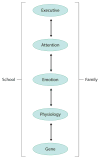School readiness and self-regulation: a developmental psychobiological approach
- PMID: 25148852
- PMCID: PMC4682347
- DOI: 10.1146/annurev-psych-010814-015221
School readiness and self-regulation: a developmental psychobiological approach
Abstract
Research on the development of self-regulation in young children provides a unifying framework for the study of school readiness. Self-regulation abilities allow for engagement in learning activities and provide the foundation for adjustment to school. A focus on readiness as self-regulation does not supplant interest in the development of acquired ability, such as early knowledge of letters and numbers; it sets the stage for it. In this article, we review research and theory indicating that self-regulation and consequently school readiness are the product of integrated developmental processes at the biological and behavioral levels that are shaped by the contexts in which development is occurring. In doing so, we illustrate the idea that research on self-regulation powerfully highlights ways in which gaps in school readiness and later achievement are linked to poverty and social and economic inequality and points the way to effective approaches to counteract these conditions.
Keywords: education; executive functions; inequality; poverty; school readiness; self-regulation.
Figures
References
-
- Ashby FG, Isen AM, Turken AU. A neuropsychological theory of positive affect and its influence on cognition. Psychol Rev. 1999;106(3):529–50. - PubMed
-
- Barnett WS, Jung K, Yarosz DJ, Thomas J, Hornbeck A, et al. Educational effects of the Tools of the Mind curriculum: a randomized trial. Early Child Res Q. 2008;23(3):299–313.
-
- Berry D, Blair C, Urasche A, Willoughby M, Vernon-Feagans, et al. Child care and resting cortisol across early childhood: Context matters. Dev Psychol. 2014;50:514–25. - PubMed
Publication types
MeSH terms
Grants and funding
LinkOut - more resources
Full Text Sources
Other Literature Sources
Medical


